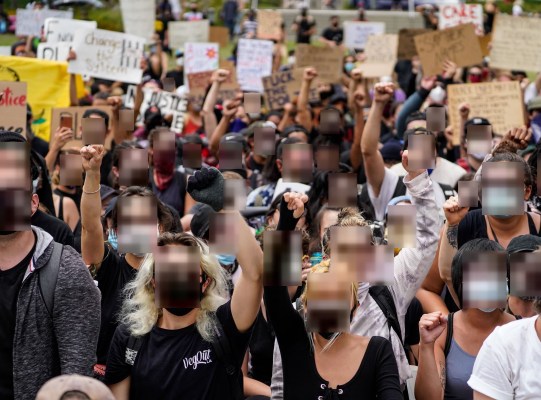
Hundreds and thousands have taken to the streets across the sphere to explain the raze of George Floyd, an unarmed shadowy man killed by a white police officer in Minneapolis final month.
Protesters have faced each unprecedented police violence and surveillance. Actual this week, the Justice Division granted the Drug Enforcement Administration, an company in most cases tasked with imposing federal drug-related licensed guidelines, the authority to “conduct covert surveillance” on civilians as piece of the authorities’s efforts to quell the protests. As one amongst doubtlessly the most tech savvy authorities agencies, it has fetch entry to to billions of domestic phone records, cell situation simulators, and, esteem many varied federal agencies, facial recognition abilities.
It’s in piece attributable to this intense surveillance that protesters fright they’d well face retaliation.
But within the previous week, developers have rushed to manufacture apps and instruments that enable protesters scrub hidden metadata from their pictures, and veil or blur faces to halt facial recognition programs from identifying protesters.
Everest Pipkin constructed a internet app that strips pictures of their metadata and lets customers blur faces — or veil faces fully, making it extra advanced for neural networks to reverse blurring. The on-line app runs entirely within the browser and doesn’t upload or retailer any info. They also originate-sourced the code, allowing somebody to fetch and run the app on their possess offline device.
i constructed a instrument for immediate scrubbing metadata from pictures and selectively blurring faces and identifiable ingredients. it runs on a phone or computer, and would not send info anyplace.
course of your pictures so that you just and others are safe: https://t.co/GbQu5ZweDq pic.twitter.com/jKjABTgPRX
— everest (@everestpipkin) Could presumably perhaps well honest 31, 2020
Pipkin is one amongst some developers who have rushed to reduction protesters provide protection to their privateness.
“I saw a bunch of discourse about how law enforcement is aggregating videos of the protests from social media to name protesters,” developer Sam Loeschen told TechCrunch. He constructed Censr, a virtual fact app that works on the iPhone XR and later, which masks and pixelates pictures in precise-time.
The app also scrubs pictures of metadata, making it extra advanced to name the source and the positioning of the masked image. Loeschen said it became an “very straightforward weekend project.” It’s at the moment in beta.
📣📣 Announcing censr: a straightforward digicam app for safeguarding your identification!
on hand for iPhone XR and up
distributing to protestors and press by means of TestFlight. Send me a DM for the link! pic.twitter.com/J1Znd2ZKqN
— Sam Loeschen (@polygone_) June 5, 2020
Noah Conk constructed an iPhone Shortcut that uses Amazon’s facial recognition system and robotically blurs any faces it detects. Conk said in a tweet there became no formula to blur pictures on the device but that he does no longer achieve the image.
The conception is tremendous, but it completely does indicate any pictures uploaded could well theoretically (and if stored) be bought by law enforcement with a well suited verbalize. You furthermore mght want to “enable untrusted shortcuts”, which could well originate the door to doubtlessly malicious shortcuts. Know the dangers ahead of allowing untrusted shortcuts, and keep it disabled as soon as you happen to don’t want it.
Serving to protesters and others blur and anonymize pictures is a conception that’s taking off.
Actual this week, halt-to-halt encrypted messaging app Signal included its possess portray blurring characteristic, one that couldn’t attain quickly sufficient as its particular person disagreeable spiked thanks to the wide adoption for the explanation that protests started.
Signal founder Moxie Marlinspike said in a weblog post that the transfer became to reduction “enhance all people within the streets,” including these protesting within the U.S. and across the sphere, in many cases defying social distancing principles by governments keep in region to dreary the unfold of the coronavirus pandemic.
“One immediate ingredient seems to be to make certain: 2020 is a moderately appropriate 365 days to duvet your face,” said Marlinspike.



